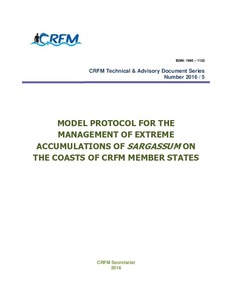Model Protocol for the Management of Extreme Accumulations of Sargassum on the Coasts of CRFM Member States.

View/
Average rating
votes
Date
2016Corporate Author
Caribbean Regional Fisheries Mechanism
Status
PublishedPages
15pp.
Metadata
Show full item recordAbstract
The 26th Meeting of the CRFM Executive Committee noted the protocol developed for the
management of extreme accumulations of Sargassum in Puerto Rico and considered the efficacy
of such a protocol being considered for adoption and implementation by the CRFM. The
Executive Committee noted that the protocol developed by Puerto Rico closely meets the current
needs of the CRFM, based on geographical as well as social and economic realities; and, mindful
of the concerns already expressed by the CRFM Ministerial Council, the Organisation of Eastern
Caribbean States (OECS) Council of Ministers, CARICOM’s Council on Trade and Economic
Development (COTED) and CARICOM Heads of Government, endorsed the development a
protocol for the management of extreme accumulations of Sargassum by the CRFM. The 14th
Meeting of the Caribbean Fisheries Forum agreed that the Puerto Rico Sargassum protocol be
used as a point of departure and modified where necessary to meet the needs of the region in
re.....
Publisher
Caribbean Regional Fisheries MechanismBelize
Series;Nr
CRFM Technical & Advisory Document;2016/5Document Language
enSustainable Development Goals (SDG)
14.2Essential Ocean Variables (EOV)
Macroalgal canopy cover and compositionBest Practice Type
Best PracticeManual (incl. handbook, guide, cookbook etc)
Spatial Coverage
Caribbean SeaBelize
Teh Grenadines
St Vincent
ISBN
978-976-8257-58-1ISSN
1995-1132Citation
Caribbean Regional Fisheries Mechanism (2016) Model Protocol for the Management of Extreme Accumulations of Sargassum on the Coasts of CRFM Member States. Belize, Caribbean Regional Fisheries Mechanism, 15pp. (CRFM Technical & Advisory Document, No. 2016/ 5). DOI: http://dx.doi.org/10.25607/OBP-857Collections
 Repository of community practices in Ocean Research, Applications and Data/Information Management
Repository of community practices in Ocean Research, Applications and Data/Information Management